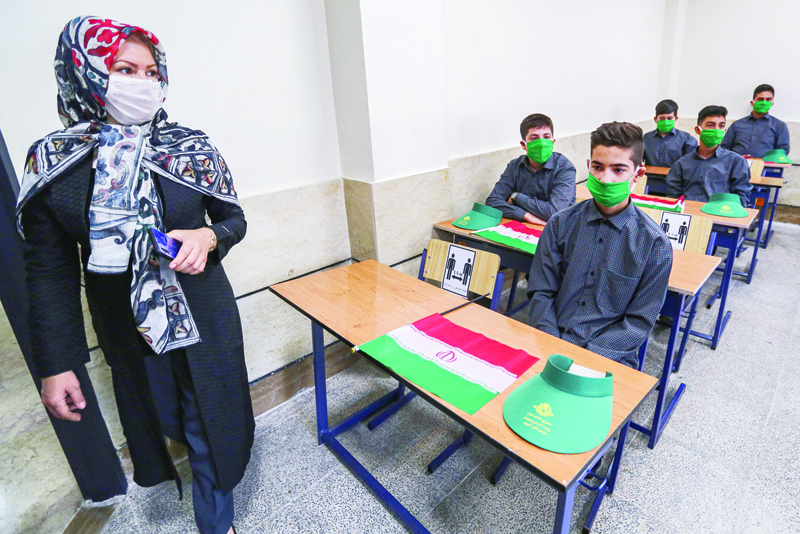
TEHRAN: The school year in Iran began on Saturday after a near six-month shutdown due to the novel coronavirus pandemic, with parents voicing concerns despite authorities pledging to enforce health protocols. Some 15 million pupils in the Islamic republic returned to class, mostly remotely, as the country continues to battle its Covid-19 outbreak, the deadliest in the Middle East with over 22,000 killed and more than 384,000 infected since the first cases were confirmed in February.
The first day of classes at Nojavanan high school in northeastern Tehran was attended by a slew of officials and journalists, as well as students. President Hassan Rouhani appeared in a video to inaugurate the new academic year at the school-a break with tradition that drew fire from some Iranians online who thought he should have come in person if students were required to be present. Education Minister Mohsen Haji-Mirzaei looked to assuage parents' concerns in a speech after he rang the bell to launch the new school year.
"I hope that families trust us and rest assured that the ministry will exercise utmost vigilance" regarding health protocols, he said. Pupils and other attendees wore masks and were required to pass through a disinfection tunnel, have their temperatures checked and sit socially distanced in the schoolyard. Other anti-virus measures at schools include keeping classes to 35 minutes and requiring students and staff to stay one meter (three feet) apart and wear masks, according to Iran's anti-virus taskforce.
Rouhani under fire
During his video address, Rouhani emphasised the need to for students to observe health protocols, calling for the "utmost discipline" in respecting measures. Rouhani's choice not to attend the opening ceremony in person drew criticism from some. "Rouhani rang the bell (to start the school year) remotely, then he expects me to send my son in person?" reformist journalist Maziar Khosravi wrote on Twitter.
Conservative film producer Mahmoud Razavi echoed Khosravi in a tweet, saying, "how can they expect people to trust protocols when the president himself does not, and send their loved ones to school?" Rouhani's government had come under fire before schools reopened, with the head of Iran's medical council, Mohammadreza Zafarghandi, writing an open letter in which he called proposed health protocols counterproductive, as students could spread the virus if they were infected but asymptomatic.
'Stressful'
This concern was shared by some teachers, parents and students at Nojavanan high school. "Controlling (Covid-19's spread) is very difficult… as is teaching kids how to follow health protocols and social distancing," school principal, Nasrin Mobini said. "We are all concerned-my colleagues, the parents, everyone."
Literature teacher Amiri, 60, said the return of students to school was "stressful", but that it was important that the first classes be held in person so teachers and students can get to know each other. One parent, only giving her surname as Azaraksh, said she brought her son for the opening day with "concern", but she preferred in-person education if health protocols were "really" observed.
Many students shared their parents' worries, but were pleased to be back at school. "We're happy that schools have reopened, but… it's still dangerous for us and others," said 14-year-old Askhan. Most classes are expected to be held remotely, though some pupils, including those in preschool and elementary school will attend classes in person intermittently. Ava Golkar, 33, the English department head at Soroush elementary school in northern Tehran, told AFP that only five pupils attended the opening day in person, while the rest watched via video streaming. - AFP

